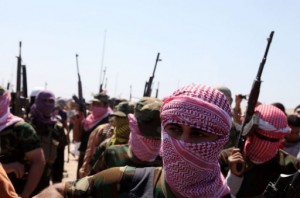
By W.G. Dunlop (AFP) – BAGHDAD — Violence in Iraq rose sharply in April, killing 460 people, according to AFP figures, and May began with attacks on Wednesday, including one on a police station, that killed 18 people.
The majority of April’s deaths came during a wave of unrest near the end of the month, when security forces moved on Sunni anti-government protesters in the north, sparking clashes that killed 53 people.
Dozens more people died in subsequent violence, which included revenge attacks on security forces. That raised fears of a return to the all-out sectarian conflict that cost tens of thousands of lives from 2006 to 2008.
The late-April violence was the deadliest so far linked to protests that broke out in Sunni areas of Shi’a-majority Iraq more than four months ago.
The protesters have called for Prime Minister Nuri al-Maliki, a Shi’a, to quit. They criticise the authorities for allegedly targeting their community with wrongful detentions and accusations of involvement in terrorism.
Unrest in April also wounded 1,219 people, according to the AFP figures, based on reports from security and medical sources.
Among the dead were 54 police, 53 soldiers, 14 Sahwa anti-Qaeda militiamen and two members of the Kurdish security forces.
The wounded included 171 police, 76 soldiers, eight Sahwa fighters and five Kurdish security forces members.
The majority of April’s remaining casualties were civilians, although the figures also include some gunmen who died or were wounded in clashes with security forces.
In March, 271 people were killed and 906 wounded, but those figures only included security forces and civilians.
On Wednesday, armed men attacked the police headquarters in Tarmiyah, north of Baghdad, killing a colonel and at least three police, an officer and a medical official said.
In Fallujah, west of the capital, a suicide bomber targeted Sahwa militiamen who were gathering to receive their pay. Four of them and a high-ranking police officer were killed, police and a doctor said.
The Sahwa, which means “Awakening” in Arabic, are made up of Sunni Arab tribesmen who joined forces with the US military against Al-Qaeda from late 2006, helping turn the tide against the insurgency.
They are regarded as traitors by Sunni militants and frequently targeted.
A car bomb in Ramadi, west of Baghdad, killed three police on Wednesday, while another in the capital left three people dead and gunmen killed two police near Tikrit, north of Baghdad, security and medical officials said.
And gunmen shot dead a provincial elections candidate in the northern city of Mosul, the capital of Nineveh, one of two provinces in which polls were postponed because authorities said security could not be ensured.
“Conditions have definitely worsened in the country,” said John Drake, an Iraq specialist with risk consulting firm AKE Group.
“If the government fails to contain the unrest and address some of the grievances of the protesters, the momentum could certainly build and lead to a reemergence of widespread violence,” he said.
Violence in Iraq has fallen from its peak during the height of the sectarian conflict in 2006 and 2007, when death tolls of more than 1,000 a month were reported.
But attacks remain common, with people killed on 29 of the 30 days in April, and more than 200 people dead in unrest each month so far this year.
